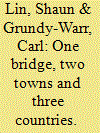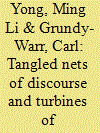|
|
|
Sort Order |
|
|
|
Items / Page
|
|
|
|
|
|
|
| Srl | Item |
| 1 |
ID:
083621


|
|
|
|
|
| Publication |
2008.
|
| Summary/Abstract |
Abstract: Drawing on field work in Southern Thailand undertaken in July 2005, the study illuminates the complex and contingent way in which the Indian Ocean tsunami of December 2004 affected communities, households and individuals. The paper problematises the indiscriminate/discriminate patterning of impact and recovery and also makes a case for a delocalised and transnational approach to understanding the impacts of the wave. Using the notion of 'tsunami footprints' and drawing on qualitative interviews, the paper proposes that impacts need to be seen in the context of the spatially dispersed networks of association that characterise the Thai space economy and Thai society. Drawing on work on poverty dynamics, the paper also explores three explanatory disjunctures in recovery transitions: the disjuncture between the pre-tsunami context and the post-tsunami situation; the disjuncture between structure and agency; and the disjuncture between the appearance of progressive and gradual change in societies and the lived reality of turbulence
|
|
|
|
|
|
|
|
|
|
|
|
|
|
|
|
| 2 |
ID:
084422


|
|
|
|
|
| Publication |
2008.
|
| Summary/Abstract |
Abstract: Drawing on field work in Southern Thailand undertaken in July 2005, the study illuminates the complex and contingent way in which the Indian Ocean tsunami of December 2004 affected communities, households and individuals. The paper problematises the indiscriminate/discriminate patterning of impact and recovery and also makes a case for a delocalised and transnational approach to understanding the impacts of the wave. Using the notion of 'tsunami footprints' and drawing on qualitative interviews, the paper proposes that impacts need to be seen in the context of the spatially dispersed networks of association that characterise the Thai space economy and Thai society. Drawing on work on poverty dynamics, the paper also explores three explanatory disjunctures in recovery transitions: the disjuncture between the pre-tsunami context and the post-tsunami situation; the disjuncture between structure and agency; and the disjuncture between the appearance of progressive and gradual change in societies and the lived reality of turbulence.
|
|
|
|
|
|
|
|
|
|
|
|
|
|
|
|
| 3 |
ID:
053508


|
|
|
|
|
| Publication |
London, Kluwer Law Inernational, 1997.
|
| Description |
xiv, 392p.
|
| Series |
International boundary studies series
|
| Standard Number |
9041106693
|
|
|
|
|
|
|
|
|
|
|
|
Copies: C:1/I:0,R:0,Q:0
Circulation
| Accession# | Call# | Current Location | Status | Policy | Location |
| 039177 | 341.42/BLA 039177 | Main | On Shelf | General | |
|
|
|
|
| 4 |
ID:
117445


|
|
|
|
|
| Publication |
2012.
|
| Summary/Abstract |
The proposed bridge between Chiang Khong and Houay Xay will form the remaining crucial link of the Asian Highway 3, connecting Bangkok to Kunming, a project highly anticipated in the Greater Mekong Subregion's (GMS) development. With China funding half the cost of the bridge, it signifies a strong player in the economic borderland. The article seeks to uncover the locals' thoughts and feelings of the bridge to raise awareness of 'voices' from the Thai-Lao border in relation to the further destinations the bridge will serve. The local perceptions of the proposed bridge are used to provide a form of comprehension of anticipatory cross-border geopolitical relations between the Thai-Lao border and China. Drawing on the concepts of critical geopolitics, anti-geopolitics and geoeconomics, it concludes by underscoring the need to listen to local perceptions at the Thai-Lao border as they signal potential ill-feelings that could jeopardise future cross-border geopolitical ties and trade.
|
|
|
|
|
|
|
|
|
|
|
|
|
|
|
|
| 5 |
ID:
067316


|
|
|
| 6 |
ID:
123513


|
|
|
|
|
| Publication |
2012.
|
| Summary/Abstract |
Hydropower development on the mainstream of the Mekong River in the Lower Mekong Basin (lmb) has become one of the most pressing issues on the development agenda, being touted as the way forward in solving energy, development and sustainability needs in the region. Despite dominant and compelling arguments in favour of such development, a growing anti-dam lobby has taken to arguing that hydropower development will threaten the economic, social, environmental and food security of some 62 million people living in the lmb. The anti-dam lobby comprises a heterogeneous assemblage of actors, agencies and networks, working to provide critical and alternative geographical (re)imaginations of the lmb. This paper explores these multiple perspectives afforded by the anti-dam lobby through the lens of knowledge production. The anti-dam lobby, it will be seen, engages in a politics of legitimacy and re-scaling with the pro-hydropower lobby, played out through varying strategies, while highlighting urgent and critical knowledge gaps which need to be taken seriously for future development in the lmb.
|
|
|
|
|
|
|
|
|
|
|
|
|
|
|
|
|
|
|
|
|